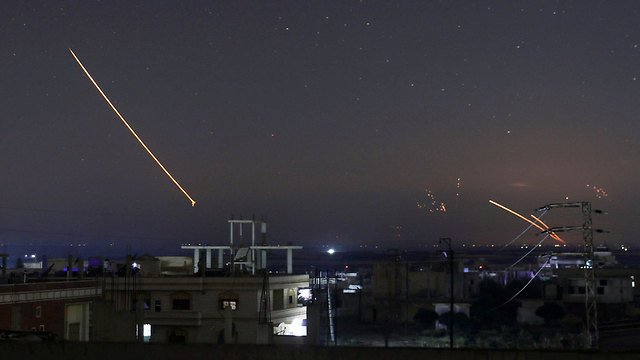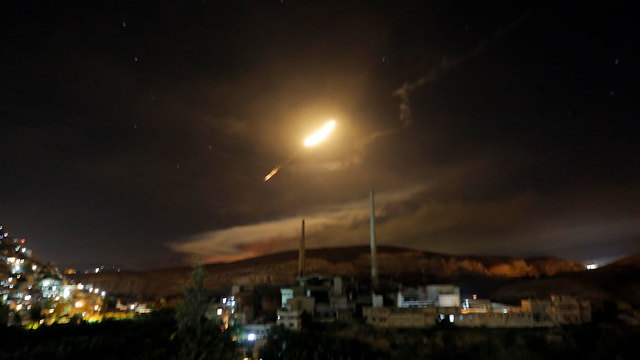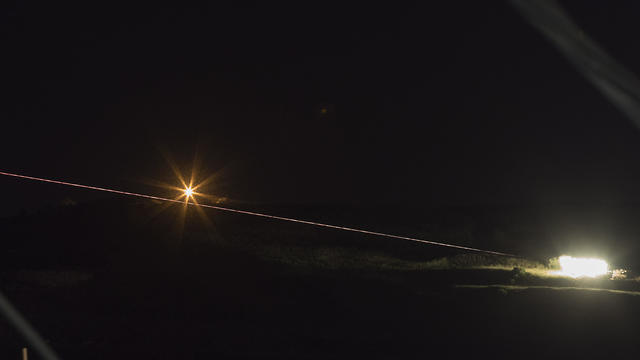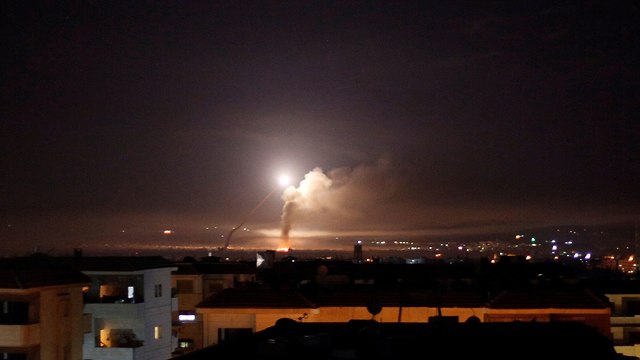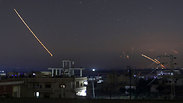
Israel, Iran walking on the precipice
Analysis: Both Israel, Iran do not desire major escalation, but situation can easily spiral out of control; Iranians miscalculated Israeli response to their failed strike; Israel holding firm to 'red line' policy vis-à-vis Iranian entrenchment in Syria; Israel must also keep in mind volatile situation in Gaza, US embassy move, or risk facing 3-front war.
The rocket attack aimed at Israeli bases in the Golan Heights by the Iranian Revolutionary Guards Wednesday night was a failure. Nevertheless, the IDF carried out punishing strikes on dozens of Iranian infrastructure targets in Syria in retaliation.
The Iranians were apparently aiming for a limited strike that would not result in widespread IDF retaliation, but would merely allow them to salvage their national pride without exacting too high a price.
Despite the futility of the Iranian missile strike—the IDF having suffered no loss of life or property and all of the Iranian missiles being either intercepted or falling on the Syrian side of the Golan Heights—the IDF responded disproportionally, according to Israel’s “red line doctrine” as articulated by the prime minister, defense minister and the army chief of staff.
About two hours after the Iranian assault, the IDF carried out pre-planned airstrikes that destroyed much of the Iranian military's infrastructures in Syria.
The commander of the Quds Force of the Revolutionary Guards, Qasem Soleimani, will need a great deal of time and funds in order to recoup the bases, intelligence posts and logistical sites destroyed in the strike. Iranian public opinion will not be pleased.
Israel’s “red line policy” states that any attack on its sovereignty will be met with an immediate response; any Iranian transfer of hi-tech weaponry that endangers the Israeli populace or may interfere with the IDF’s freedom of operation will be targeted; and the use of unconventional weapons—nuclear, chemical or biological—against Israel will not be tolerated.
A similar red line policy regarding Israeli retaliation exists in the south, on the Gaza front.
Another Israeli red line that was crossed Wednesday night was Syrian antiaircraft fire targeting IAF jets as they were attacking Iranian targets. No Israeli aircraft were hit, but Israel destroyed five Syrian surface-to-air missile batteries.
This is in addition to the considerable amount of antiaircraft batteries that Israel hit at the beginning of the year in response to the downing of an Israeli jet.
The Israeli strike was also meant to signal to President Bashar Assad and Russian President Vladimir Putin that the continued military presence of Iran in Syria will harm their vital interests: the constant skirmishing between Israel and Iran on Syrian territory will torpedo efforts to end the long and bloody Syrian civil war and further delay Assad’s regaining control over all—or most—of Syria and the rebuilding of the country.
The Iranian Revolutionary Guards’ “revenge attack,” though very limited and unsuccessful, was a blatant violation of Israeli sovereignty and a direct Iranian aggression on Israeli territory; no doubt a violation of international law and a casus belli—justification for war.
However, since the Iranians failed and the fact that Israel suffered no losses and is also uninterested in a dangerous deterioration into war on the northern front, it is safe to assume that the IDF hit the Iranians hard enough to serve as an effective deterrent. The strike was nonetheless measured so as to prevent further escalation.
Soleimani and the Iranians can now claim to have avenged their men who were killed in earlier (alleged) Israeli airstrikes but remain cautious so as not to extract a further punishing Israeli response.
Volatile Palestinian situation taken into consideration
In all likelihood, when considering their response, the prime minister, defense minister and the chief of staff took into consideration the potentially explosive events next week including the transfer of the American Embassy to Jerusalem, Nakba Day, and the beginning of the Muslim holy month of Ramadan.
In a scenario where a conflict with Iran in the north drags on, perhaps even spiraling into Lebanon, the IDF could be facing multiple fronts in the north, the south, the West Bank and the civilian home front.
Although the IDF is built to deal with such a scenario and fight a three-front war (plus the home front), there is currently no desire to enter into a long, drawn out war with mass casualties and significant economic damage. There is no doubt that this was taken into consideration when Israel planned its response to Iran’s failed strike.
On the other hand, it was clear to Israeli policymakers that if Israel showed restraint in the face of Iranian Quds Force’s aggressions, it would erode Israeli deterrence power vis-à-vis Iran. Therefore, the best solution for all parties would be for Russia to assume the position of responsible adult and broker a ceasefire between the two sides.
Such a ceasefire would have to guarantee Israel that Iran will cease its attempts to establish itself in Syria, at least for a few months, as well as cease its attacks against Israel.
Meanwhile, the situation will calm and perhaps it will be possible to achieve a more stable agreement. We must keep in mind that Iran has an interest in not allowing the situation in Syria to further escalate in order not to confirm US President Donald Trump and Prime Minister Benjamin Netanyahu’s claims against them, also aggravating their status in Europe and Russia and affecting their economic situation.
What exactly happened Wednesday night?
Around midnight, the Revolutionary Guards’ “Quds Force” tried to carry out a revenge attack against IDF first-line bases in the Golan Heights. No Israeli towns were hit and none of the 20 rockets launched by Shiite militants landed in Israeli territory.
IAF air defenses intercepted four of the rockets over the Syrian Golan Heights. The rest were not targeted as they were determined to not present a danger to IDF bases or Israeli towns.
This is the second time Iran has attempted to attack Israel from Syrian territory. In the past, all the attacks carried out against Israel from Syria were by Iranian proxies, primarily Hezbollah, but there were also instances of forces loyal to the Syrian regime, acting in the name of the Iranians, shooting rockets into Israel.
In every instance, Israel reacted by destroying the launchers or their operators in Syria. The latest attack was carried out by Iranian officers, a fact that presented Israeli security officials with a dilemma: should Israel respond, in accordance with the “red line” policy, and hit the Iranians but risk escalating the situation or, perhaps, overlook the incident and hope that the Iranians will see the matter as closed.
Israel chose the former, unwilling to risk the erosion of military deterrence, effectively acknowledging that the northern front will remain tense.
When the Iranians launched an armed UAV into Israel in the beginning of this year, the IDF downed the aircraft and responded by attacking the command center, killing the Iranians manning the controls. In the subsequent skirmish, an IAF F-16 was downed by a Syrian missile and Israel destroyed three Syrian anti-aircraft batteries that targeted its planes.
The Revolutionary Guards have an interest in blurring their fingerprints to avoid harsh international censure, especially during this sensitive period when the US seeks to re-impose economic sanctions on Iran. They also seek to avoid casualties among their men, as it triggers Iranian home front opposition to their government’s misadventures in Syria in support of the Assad regime against Israel.
When Soleimani’s men began planning their revenge against Israel for its strike on the T-4 Airbase, they planned a surface-to-surface missile attack against an IDF base in northern Israel. But the Quds force commander and the Iranian Air Force commander assigned the mission to a joint force of Iraqi-Shiite militia members who received instruction from Hezbollah rocket experts.
Those units failed to carry out their mission, probably due to Israeli strikes in recent days. Therefore, the Revolutionary Guards decided to carry out the attack directly, despite the risks and international complications involved.
Presumably, in order to increase their chances of success, the Iranians chose short-range rockets that are easier to conceal and move secretly. Their launchers are small and can hardly be detected from the air or by ground sensors.
Such rockets can also be launched by timer and remote control from improvised launchers buried in the ground. Their two drawbacks, though, is their lack of accuracy and the fact that their warheads only hold about 40 kilograms of TNT.
Nevertheless, such rockets can cause considerable damage and loss of life if they were to fall on Israeli bases without warning. Due to the ease in concealing them, the Revolutionary Guards succeeded in launching the rockets but—as expected—Israeli defenses, primarily the Iron Dome, prevented them from hitting any Israeli targets.
What now?
Now, after last night’s harsh response in Syria, Israel will decide how much further it wishes to challenge the Iranians until they decide that they cannot allow themselves to be on the receiving end anymore of Israel’s punishing strikes, and end the bellicosity on their own. Alternatively, they will carry on into a full scale war that might include Hezbollah and its massive arsenal of rockets in Lebanon.
Such a scenario is undesirable to both sides, but it is entirely in the realm of possibility considering the current explosive atmosphere.
Meanwhile the IDF and the Quds Force continue the dangerous game of walking on the edge while avoiding a full blown war. The question remains, for how much longer can this continue?











